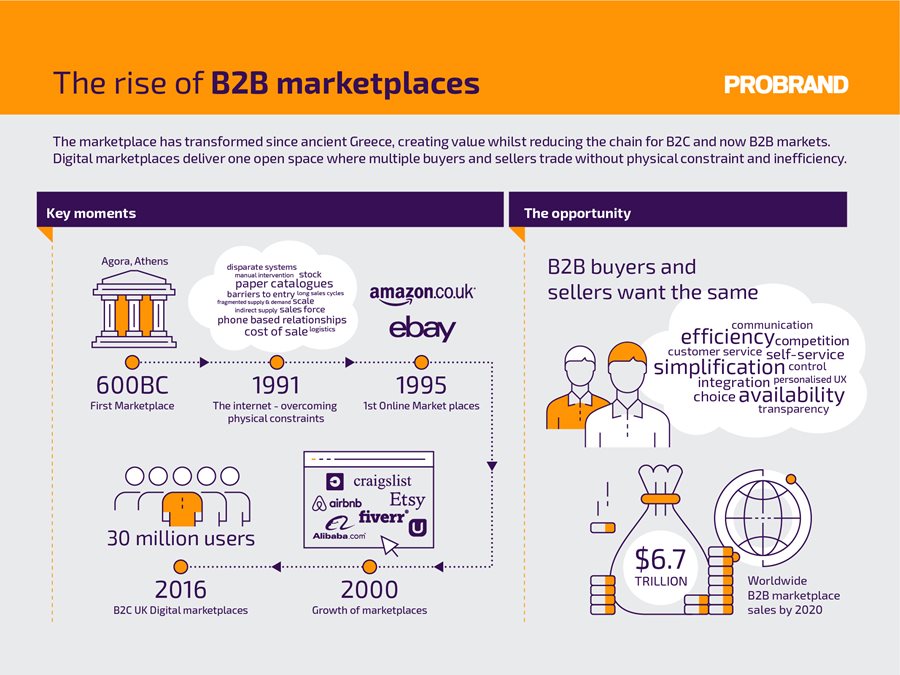Just what is a digital or online marketplace: 6 things IT buyers & sellers want
How we buy products and services online has changed significantly since ecommerce websites first started to appear in the 1990s. These early e-shops were designed to mirror the paper catalogues which were the dominant alternative to the high street before the emergence of the internet.
Save Time and Money with Efficient IT Procurement
Streamline your IT procurement with Probrand’s platform. Register now to access real-time pricing, save money, and optimise your IT budget.
Register now

The nature of online buying has changed, however. Customers are now moving away from the e-shop format and opting for online offerings that more closely resemble a traditional marketplace. In these arenas greater transparency exists, with buyers able to see products, prices and stock levels from multiple suppliers all in one place.
Their popularity has been evident in the consumer market through the rise of platforms such as Airbnb, Skyscanner and eBay. But it’s not just in the consumer market where we’re seeing growth in this model of buying and selling.
Analyst Frost & Sullivan has claimed that B2B online marketplaces are gathering such momentum that their worth will reach $6.7 trillion by 2020. But what’s the appeal? Why are online marketplaces proving to be so popular? Here are six key reasons for both buyers and suppliers:
Reason 1: Choice
- Buyer: Customers get to compare products and interact with multiple vendors all in one place. This one-stop-shop approach cuts out the time wasted shopping around multiple ecommerce sites.
- Supplier: Vendors can ensure their products are visible to customers and that end users can make a fair comparison of the pros of their products versus the cons of their competitors’.

Reason 2: Transparency
- Buyer: Marketplaces fill buyers with the trust that they are getting the best possible price. This is because they can directly compare products, cost and availability (stock levels). Price and stock change every minute, read our report looking at how market volatility costs time and money
- Supplier: The seller can provide buyers with up-to-date information on their products, prices and stock levels and communicate with them directly.

Reason 3: Integration
- Buyer: The purchaser can automate much of the administrative process whenever they make a purchase. This is because marketplaces ensure procedural checks, such as price comparison, are carried out. This is allowing organisations to integrate their own procurement systems with an online marketplace.
- Supplier: A vendor can ensure products, specifications, prices and stock levels are always up-to-date by integrating their systems with an online marketplace.
Reason 4: Efficiency
- Buyer: Marketplaces speed up the purchasing process by reducing the administrative burden and allowing all purchases to be made from one platform. With numerous purchases consolidated in to one delivery, it is reducing distribution costs and the CO2 emissions caused by multiple deliveries.
- Supplier: A vendor can also remove much of the administration involved by automating the update of product information and stock levels. Thus, ensuring customers are always receiving the latest information.

Reason 5: Personalisation
- Buyer: End users can immediately discover whether they are eligible for sector-based discounts when they use an online marketplace. This is because these digital platforms can instantly recognise the industry of a registered buyer.
- Supplier: Vendors can target a specific industry by offering a promotional discount and be safe in the knowledge this won’t be swallowed up by a reseller looking to maximise their profits. This could save vendors huge amounts of money in advertising and marketing offers.

Reason 6: Self-service
- Buyer: The purchaser can buy immediately online. Research has shown that three quarters of B2B buyers want the option to buy online and the marketplace allows them to do this – without taking away the option to talk to an adviser if the purchasing decision is more complex.
- Supplier: Vendors can make their products available for sale 24/7 and still maintain the ability to interact and answer buyer’s questions through a marketplace.
